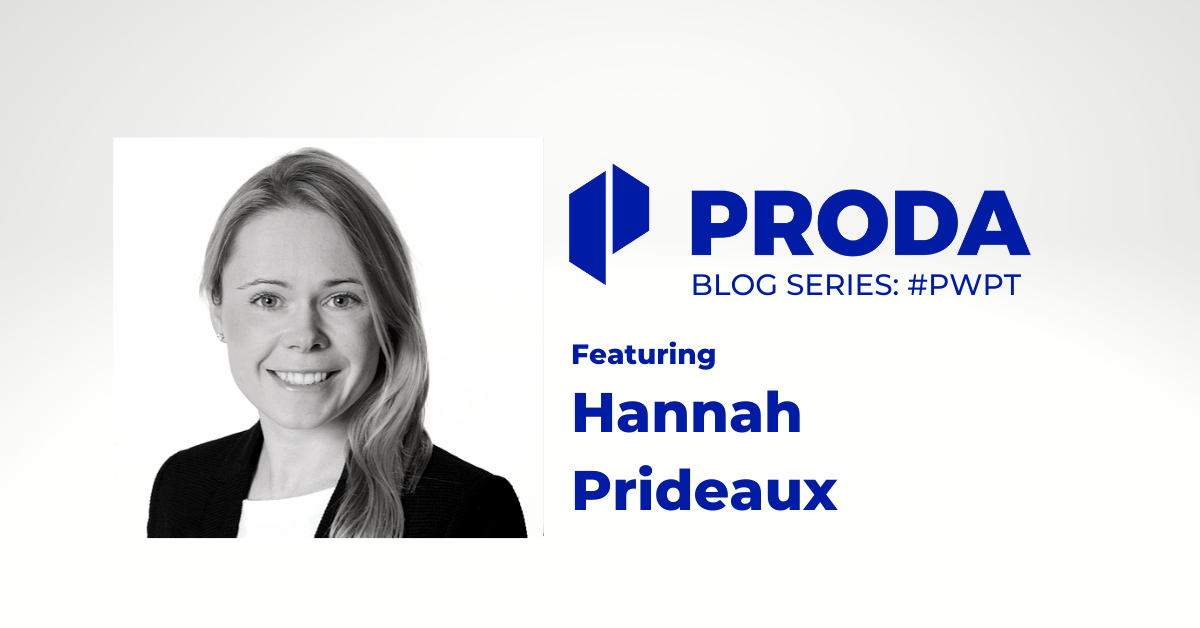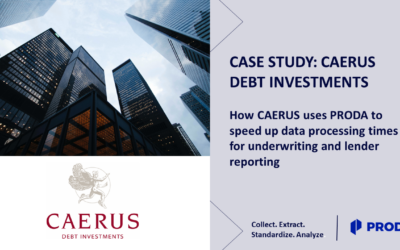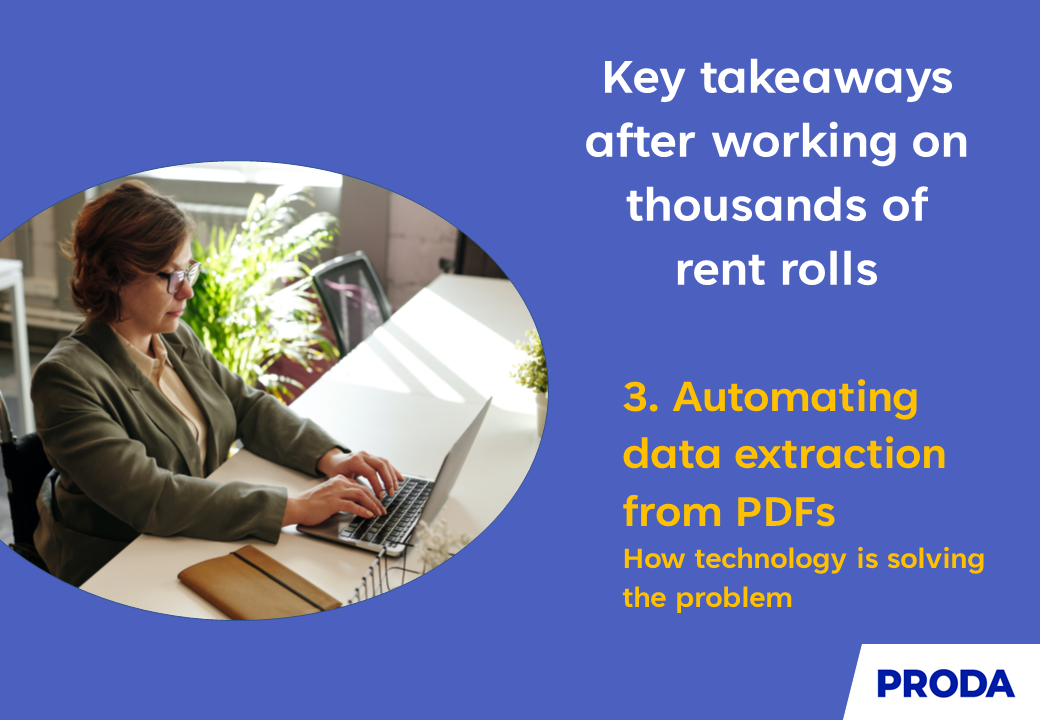– A Blog Series By Proda
We’re back this week, with another addition to our blog series: PRODA’s Powerful Women of PropTech (#PWPT); this week we caught up with Hannah Prideaux – Investment Manager and Head of Operations at M7 Structura.
For the sixth post of our ongoing blog series, PRODA’s Powerful Women of PropTech, we spoke to Hannah Prideaux, Investment Manager and Head of Operations at M7 Structura. If you missed Prachi’s blog post last week, or any of the previous posts from the series, you can catch up on them, here.
M7 Structura are a London-based venture capital firm who specialise in investing in Seed and Series A-stage PropTech companies, in Europe. With over 12 years of experience in the real estate industry, and beyond, we’re pleased to have caught up with Hannah, to get her thoughts on being a female in both the PropTech, and real estate industries.
Read the full interview below.
MV: Can you tell us a little bit about your professional journey, from beginning your career as a chartered surveyor, to now being the Investment Manager and Head of Operations at M7 Structura?
HP: I started my career at Savills on the commercial grad scheme, joining just before the GFC. I spent another couple of years specialising in valuations, before deciding to move on to PwC. For the next 5 years of my career, I worked across real estate valuations, debt portfolio, sales and acquisitions and real estate corporate finance.
I made the decision to leave the traditional property market mid 2017 after around 10 years on the real estate advisory side. I had a strong desire to move into the property technology space in order to try and solve some of the issues and inefficiencies that we’re all too familiar with, within real estate, and that I had encountered over my career. I moved to a two-man residential platform start-up where my role was everything non-tech related, including product, operations and BD; it was fantastic to be thrown into the deep end. The company unfortunately didn’t take off, but it was a great experience and absolutely the right direction to continue to pursue.
I moved to another PropTech company, within the tenant engagement space, and developed their BD team, alongside other roles. Around this time, I also started accepting invitations to speak on panels, and at conferences, to build confidence. I would recommend anyone to do the same, if the opportunity arises; the fear does eventually subside!
Towards the end of 2019, I was presented with a fantastic opportunity to help set up a new Venture Capital fund investing in PropTech companies, M7 Structura, a JV with M7 Real Estate. I was the first hire by the Managing Partner and we specialize in investing in Seed and Series A stage PropTech companies in Europe.
MV: What does a ‘typical’ day look like for you, as an Investment Manager and Head of Operations?
HP: My role is varied, split between fund raising, deal sourcing/investments and operations. For the last couple of months, given the current climate, I have largely focused on our fund docs, investment opportunities and marketing. I’m pleased to say that we made our first investment a couple of months ago (despite the uncertainty of Covid-19) into a construction technology business called IAND – a SaaS platform for project management teams and organisations to manage professional services suppliers across construction and infrastructure.
For the last week or so, my focus has moved towards the fundraising side; the market appears to be interested in looking at opportunities again and revisiting conversations. Certainly, for the first couple of months of lockdown, it wasn’t the right time to be going out to market.
“Founding a company is high risk and around 90% are said to fail. Coupled with this, when I chose my university degree (many years ago!), tech related degrees were not really encouraged for females therefore, also contributing to this current gap. “
MV: Have you noticed a dearth of female led start-ups in the PropTech space during your time investing in PropTech ventures? If so, why do you believe this is?
HP: Our first investment is a female founded company, and I am also speaking with a number of other female founded companies. I do believe that the ratio is beginning to change, however, for the reasons below, I’m not hugely surprised that there are presently fewer female led start-ups.
A study from 2019, which analysed gender and the technology sector as a whole, stated that 1-in-3 UK entrepreneurs is female. However, in PropTech, I understand that it is even lower at around 1-in-10. In addition, a study by Global Entrepreneurship Monitor concluded that women have slightly lower capability perceptions than men, and also greater levels of fear and failure; founding a company is high risk and around 90% are said to fail. Coupled with this, when I chose my university degree (many years ago!), tech related degrees were not really encouraged for females therefore, also contributing to this current gap.
On a more positive note, if we look at the real estate sector, while only around 15% of the total workforce is made up of women, the gender split amongst the younger age groups is closer to even, therefore I believe that the founder gender gap will continue to reduce.
MV: What is the biggest challenge that you have faced, if any, as a female in the PropTech industry and have you felt any pressure as a female leader in the PropTech industry?
HP: I have faced my fair share of challenges and successes throughout my career, as I’m sure we all have, but I don’t believe that these have been gender related. Since starting my career in 2007 I have always just tried to get on with the task in hand and not ponder on whether the success or difficulties that I have faced are because of my gender or not.
An overarching comment I would make is that the most successful teams and companies have diverse workforces. Both men and women bring different qualities, views and ways of working to the table, and employers should acknowledge and embrace these.
MV: The Power of PropTech is undeniable and the industry is considered one of the fastest growing in the world, when the world overcomes the current uncertainties we are all facing together, what do you believe the future will look like for PropTech?
HP: As we know, real estate is the largest global asset class and has been one of the slowest to adopt technology. There is a huge opportunity within the sector to adopt technology to, for example, enable efficiency gains, cost reductions, sustainability improvements and data capture and utilisation. Ultimately, I think that Covid will act as a catalyst for additional adoption of technology across real estate and construction, as the benefits can be evidenced. In addition, I believe that the environmental heath of buildings will now be much higher up on agendas.
As we come out of Covid-19, I think that we will see more companies willing to adopt and trial new solutions in order to capture some of the opportunities I have mentioned above. In addition, if they haven’t already done so, businesses will very likely have a dedicated person(s) to take control of their technology agenda and drive change.
Going forward, it is likely that we will see some consolidation in the sector and continue to see sensible re-pricing compared to pre-Covid levels. However, the most resilient PropTech companies will prosper after this pandemic. Strong companies that are solving a genuine market problem and are hitting the right metrics, will be very much sought after, both by investors, and adopters.
MV: What excites you the most when you think of the new future of PropTech that we are heading towards?
HP: There are a few areas that I think present exciting opportunities, including better collaboration between solutions, easier collaboration between PropTech companies and end users (often traditional real estate companies) and some consolidation of technology solutions. At present, it feels as though there are too many solutions in certain sectors and not enough differentiation.
Another area which is quite rightly high on all agendas is sustainability. There are a number of solutions that we’re speaking with, which are either directly or indirectly positively impacting sustainability in buildings and construction, often via improving efficiencies, reducing re-work and adopting the most appropriate resources from the outset. I think that these types of solutions are particularly exciting and also crucial in order to reduce the hugely negative impact of constructing and operating buildings, and for both new and existing stock.
“In terms of barriers, I don’t personally believe there are barriers to working in the PropTech industry. I believe that if you work hard and you want to achieve something, then you will achieve it. “
MV: Finally, what advice would you give to any young women or women in general who may be considering a career in PropTech, but feel there may be a barrier due to preconceived notions regarding gender?
HP: In terms of barriers, I don’t personally believe there are barriers to working in the PropTech industry. I believe that if you work hard and you want to achieve something, then you will achieve it. As I mentioned before, per a study by GEM, women unfortunately have slightly lower capability perceptions than men, as well as a greater fear of failure, therefore I believe that this is something that needs to be tackled by women, as well as being acknowledged and embraced by potential future employers.
I would advise anyone looking to enter the PropTech market to speak to as many people as possible in the industry, as well as fully appreciating and understanding the challenges that need to be solved and the subsequent opportunities.
***
Written by Manisha Veja, Featuring Hannah Prideaux.
A special thank you to Hannah for taking part in our blog series. If you are interested in featuring in the series please email mveja@proda.ai.
We will be back next week with another addition to our blog series, as we continue to interview the inspiring women both internally at PRODA, as well as externally. In the meantime, for the latest news and updates follow us on LinkedIn.




